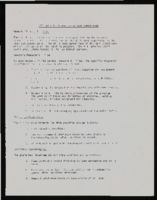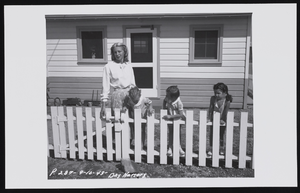Search the Special Collections and Archives Portal
Search Results
Billy's Day Out, 2004
Level of Description
Archival Collection
Collection Name: Guide to the Canadian Film Centre Worldwide Short Film Festival Submissions
Box/Folder: Box 2004-042
Archival Component

Hamed Ahmady oral history interview: transcript
Date
Archival Collection
Description
Oral history interview with Hamed Ahmady conducted by Stefani Evans on March 22, 2023 for the Reflections: the Las Vegas Asian American and Pacific Islander Oral History Project. Interviewed by Stefani Evans. Culinary Union Local 226 organizer Hamed Ahmady recalls his childhood as the oldest of six children in Mazar-e Sharif in northern Afghanistan. As an child, he remembers hearing about the September 11, 2001 attack in New York while living in a Taliban-controlled city on a television connected to a concealed antenna that received signals from Uzbekistan. He recalls how, one month after he graduated high school, he became an translator for the U.S. Army, which he did for more than four years. He talks about securing his Special Immigrant Visa (SIV); landing in Los Angeles, California in 2013 and moving his family to the United States; and supporting his siblings and parents in Afghanistan. He also discusses relocating his family from California to Las Vegas, Nevada in 2018, finding a mosque community, and working with Culinary Union Local 226.
Text

Dr. Nancy Leveque interview, July 3, 1975: transcript
Date
Archival Collection
Description
On July 3, 1975, Robin Wright interviewed Doctor Nancy Leveque (b. 1933 in Oak Park, Illinois) about her time living in Las Vegas, Nevada. The interview covers, among many wide-ranging topics, Leveque’s move to and away from Las Vegas, her career as a veterinarian, and the practice she and her then-husband built. Leveque also discusses how the city of Las Vegas has changed-environmentally and socially-, special interest groups and social activities, as well as natural phenomena. Throughout the course of the interview, Leveque provides anecdotes about prominent figures and old Las Vegas traditions, such as Helldorado.
Text

Transcript of interview with Patricia Ross by Judy Harrell, March 19, 2014
Date
Archival Collection
Description
Patty Ann Drew’s life experiences capture large movements in Las Vegas history: mob-dominated gambling, the Helldorado Rodeo, explosive growth, medical advances, and Clark County School District’s Sixth Grade Centers—all in a desert city centered in the Mormon Culture Region. Patty arrived in Las Vegas as an infant with her parents and older brothers in 1944 and was raised in the Huntridge area, where she and her brothers attended John S. Park Elementary School and matriculated from there to Las Vegas High School. In this interview, Patty talks about her parents working on the Strip, her school days, joining the Church of Jesus Christ of Latter-day Saints, marrying her high school sweetheart, and becoming a young mother in Las Vegas. After Patty married her second husband, Thomas Ross, the couple built a house west of Jones Boulevard and Patty gave birth to her third son. In addition, she returned to school to earn her Bachelor’s and Master’s degrees and taught at C. H. Decker Elementary School for twenty years.
Text

Interview with Frank Solaegui, December 1, 2004
Date
Archival Collection
Description
Text
Stella Champo Iaconis oral history interviews
Identifier
Abstract
Oral history interview with Stella Champo Iaconis conducted by Kay Long on May 14, 1997, May 21, 1997, May 26, 1997, and September 22, 1997 for the Women's Research Institute of Nevada (WRIN) Las Vegas Women Oral History Project. Iaconis opens her interviews discussing her difficult upbringing and life on a ranch in Las Vegas, Nevada with her dad in the 1910s and 1920s. Iaconis then describes her experiences as a waitress in Las Vegas. As the interviews continue, Iaconis discusses Block 16 and sex work, the Helldorado Days, and life in 1930s Las Vegas. Iaconis ends the interview talking about her father and his career as a miner; her many husbands; and her personal history in Las Vegas.
Archival Collection

Interview with Rosemary Lynch, June 8, 2004
Date
Archival Collection
Description
Text

Day Care Center Project: correspondence, job descriptions, and documents
Date
Archival Collection
Description
From the Clark County Economic Opportunity Board Records -- Series II: Projects. This folder contains job descriptions, correspondence, and other documents related to the Day Care Center Project between 1964-1966.
Text

Edith Leavitt interview, February 7, 1977: transcript
Date
Archival Collection
Description
On February 7, 1977, collector Enrico Messina interviewed Edith Leavitt (born April 12th, 1924, in St. George, Utah) at her home in Las Vegas, Nevada. In this interview, Mrs. Leavitt talks about teaching in Southern Nevada, including in the Virgin Valley and in Las Vegas. She also discusses the changing education system in Southern Nevada during her time as an educator.
Text

Day nursery at Basic Magnesium Industries, image 001: photographic print
Date
Archival Collection
Description
Image
